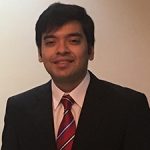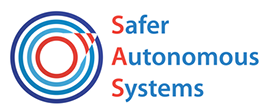Despite the travel limitations imposed by the COVID-19 pandemic, the online NWE-4 was a great success and a valuable experience for each ESR. they got the chance to interact socially with other ESRs and benefit from the various scientific and soft-skill trainings.
The 4th Network Wide Event (NWE) of the European Union Horizon 2020 MSCA program on Safer Autonomous Systems (SAS) took place from 3rd May till the 7th of May, 2021. As per the original agenda, the NWE was scheduled to take place physically at RH-Marines in the Netherlands. However, given the prevalent circumstances with respect to the COVID-19 pandemic, the program was organized fully online. In this blog, the main highlights of SAS NWE-4 are presented.
Mystery Box
Before the NWE even started, all ESRs and members of the SAS consortium received a ‘mystery box’ from RH-Marine, the SAS industrial partner responsible for organizing the 4th NWE.

The mystery box contained various sweet and savory snacks. It also contained a jump rope so that the consortium members can burn off the consumed calories and stay fit.
Monday, the 3rd of May 2021
The NWE officially kicked off on the 3rd of May 2021 with a warm welcome by the SAS project manager to all the ESRs. It was followed up by an ESR-council in which all the ESRs discussed several important matters such as the effect of the pandemic on their individual research projects, possible collaboration between the various ESRs, enhancing social outreach of the SAS project etc.
The day finished off with a very interesting soft-skill training on “Creative thinking for researchers” by Peter van der Klugt from PK-Marines. The talk was a gist of the life-long experience of Peter working as a researcher in various domains.

Tuesday, the 4th of May 2021
To start things off, the coordinator of the SAS program, Prof. Davy Pissoort welcomed all members of the SAS consortium and the ESRs. He then gave an overview of the progress of the SAS project. One of the achieved milestones was the successful submission of the SAS-midterm progress project in December last year in which all ESRs had contributed significantly. Furthermore, he gave an update about the individual SAS deliverables and milestones of each ESR.

One of the most cardinal aspects of a NWE is the individual research presentation of each ESR. All 15 ESRs had to upload their pre-recorded presentations which were then viewed by all members of the consortium. A Q&A session was organized each time after three or four research presentations. The presentations were focused on a host of topics pertinent to safety of autonomous systems such as safety monitors in Machine Learning, dynamic safety assurance, uncertainties in sensor-based systems, electromagnetic compatibility issues etc.
The valuable feedback from the experts in the SAS consortium greatly helped each ESR in their individual research areas.
Wednesday, the 5th of May 2021
The 3rd day of NWE commenced with the final research presentations and Q&A session. Followed by these, the parallel work package discussion sessions started. Each session was moderated by a work package leader. The work package leader discussed possible areas of research collaboration within each work package, progress with respect to the SAS milestones and deliverables, and possible delays in secondment due to the pandemic.
Carrying out an academic/ Industrial secondment at one of the partner institutes/companies is an important aspect of a MSCA program. However, given the nature of travel restrictions due to the pandemic, many ESRs were forced to engage in online virtual secondments.
The day signed off by a keynote talk on “Autonomous Inland shipping: Opportunities and Challenges” from Prof. Peter Slaets from KU Leuven.
Thursday, the 6th of May 2021
On the 4th day of the NWE, ESRs attended a very interesting scientific training on “Safety, complexity, AI and autonomous systems – holistic perspectives on safety assurance.” by Simon Burton from Fraunhofer IKS. We then had the first problem solving session of the SAS program in which ESRs presented their opinion and engaged in open discussion with experts in the field of system safety. The topics of discussion were online vs offline learning, safety concepts, and the role of media with respect to AV deployment.
Friday, the 7th of May 2021
On Friday, the ESRs attended the last scientific training on “Autonomous Vehicles” by Prof. Siddartha Khastgir from the University of Warwick. The talk explained the concept and relevance of Operational Design Domain (ODD) and scenario coverage of AVs.

An ESR social activity was also organized in the evening. ESRs played online games and engaged in small talk with each other. It was heartening to see all the ESRs in high spirits despite all the gloominess surrounding the pandemic.

Despite the travel limitations imposed by the COVID-19 pandemic, the online NWE-4 was a great success and a valuable experience for each ESR. they got the chance to interact socially with other ESRs and benefit from the various scientific and soft-skill trainings. With the pandemic situation expected to improve in the coming months due to the increasing vaccination grade, we hope that we can all meet physically for our next NWE at Horiba Mira in the United Kingdom later this year.
About the Author: Hassan Tirmizi
 Hassan Tirmizi completed his Bachelor’s in Electrical engineering from Pakistan in 2015 specializing in Electrical Power Systems and Renewable energy. He subsequently joined the joint EU funded Masters program in Sustainable Transportation of Energy and Electrical Power Systems (EMMC STEPS) as an Erasmus Mundus Scholar and spent a semester each at the University of Nottingham(UK), University of Oviedo(Spain), and the Politechnical Institute of Coimbra (Portugal). Since 2019 he is working as an Early Stage Researcher on the Marie Curie Horizon 2020 European Training Network on Safer Autonomous Systems at KU Leuven, Bruges Campus.
Hassan Tirmizi completed his Bachelor’s in Electrical engineering from Pakistan in 2015 specializing in Electrical Power Systems and Renewable energy. He subsequently joined the joint EU funded Masters program in Sustainable Transportation of Energy and Electrical Power Systems (EMMC STEPS) as an Erasmus Mundus Scholar and spent a semester each at the University of Nottingham(UK), University of Oviedo(Spain), and the Politechnical Institute of Coimbra (Portugal). Since 2019 he is working as an Early Stage Researcher on the Marie Curie Horizon 2020 European Training Network on Safer Autonomous Systems at KU Leuven, Bruges Campus.


